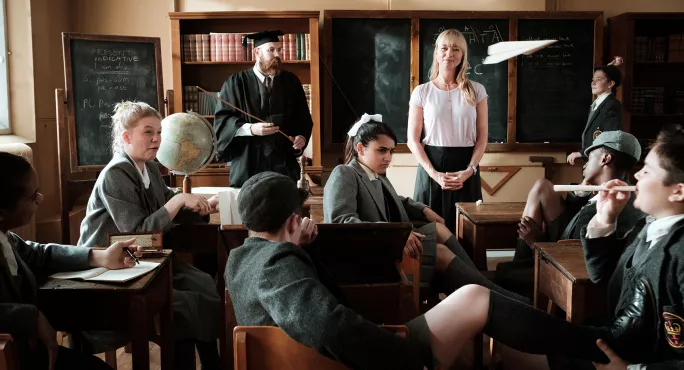It is the 1920s. After a hearty lunch, the teacher at the “open-air school” announces it’s time for pupils to take a compulsory hour-long nap in deckchairs on the lawn.
The children, giggling with delight, rush for the chairs in excitement, curling up under their tartan blankets.
“Having a nap was the highlight of my life, to be honest," says one girl after emerging refreshed.
This is one of those moments while watching BBC Two’s Back in Time for School series when I thought: “Now that sounds like a good idea…why don’t we do that now?” A lack of sleep is the scourge of our time.
However, there are other moments in the time-travelling show – which records a group of modern-day teenagers experiencing the changes in schooling over the past 120 years – that make you gasp with horror. For example, female teachers being sacked when they get married (once the recruitment crisis is over, obviously) and girls learning "mothercraft" while boys do science.
In the Victorian times, the pupils are fed brimstone and treacle for their health and are left retching onto their desks. Pupils are taught imperialist, racist drivel in geography lessons.
After the First World War, the pupils’ heads are measured to monitor potential intelligence and they learn Esperanto in pursuit of world peace.
In the 1940s, students are sent to grammar school, where they hold debates and learn deportment; the class system still seems firmly entrenched.
Then in the 1960s, things get a bit groovier and secondary modern kids enjoy hands-on lessons in "rural studies", learning how to herd geese and lay bricks.
The next episode, the “progressive” 1970s, promises to be illuminating and I can't wait to see the children with their 1980s computers. I’ll be thrilled to see what the 1990s holds, the period when I attended secondary school.
Vulnerable to fads
The series may be cartoonish, but there is a thread going through each of the episodes, which is that schools are a product of their era. The trends and obsessions of one decade fade to nothing as time moves on.
Where once cod liver oil was thought to be a panacea, we now have mindfulness lessons. Instead of measuring heads, we measure “performance” in a narrow range of subjects. We talk manically about “creativity” while allowing no time for it to take place.
Typewriting classes for girls have given way to an almost hysterical urgency to get young children computer coding.
Because it involves children and politicians are in charge, schools will always be at the forefront of any drive to cure the world's ills. And the fact that teaching lies somewhere between an art, a craft and a science will mean it remains vulnerable to fads and crazes.
Who remembers Brain Gym and learning styles? Unfortunately, many of us do. And more unfortunately still, some still believe in them.
If you think that we have reached a peak of ridiculousness in education, a sort of internet-enhanced silliness obsessed with high-stakes accountability and big data, there is one small comfort: much of this will pass.
There will be a moment when the system implodes and regulates itself back to more sensible levels; perhaps we are on the brink of it now, it’s hard to tell until after it’s happened. And a new mania will take over. We will look back and laugh/weep as the next era emerges.
Another comfort is how the series underlines how much fairer our current education system is: whatever you think about the continuing existence of grammar schools, private schools, setting and streaming, the opportunities open to any young person now are infinitely better than they were 100 years ago.
Peering at a migraine-inducing spreadsheet of disappointing GCSE results, and awaiting the rap on the door from a grim-faced Ofsted inspector, this may not seem like much comfort, but it should do.
Irena Barker is a freelance writer
Back in Time for School continues on BBC Two and is currently available on iPlayer




